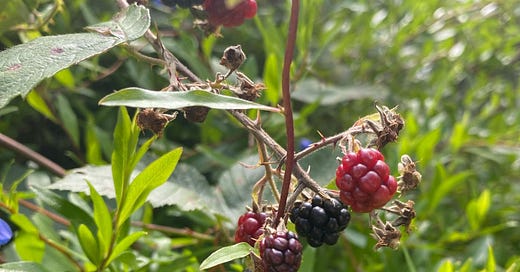Growing up, I spent many school holidays on my aunt and uncle’s merino farm outside of Goulburn where eggs came straight from the chickens, fruit came off trees and filled box after abundant box that was sent off to relatives, potatoes were dug out of the soil, and we carried many frogs outside who made their way into the kitchen on bunches of spinach. Processed foods were bought sparingly in the once-a-week trip into town. It was a way of life that seemed old fashioned to my city-based, Nickelodeon drenched childhood, but one that taught me about seasonality and a connection between food and land that I cherish today.
A food system that focuses on convenience over connection with food production, is actually not good for us. It not only damages the environment but has effects on health and wellbeing too. It is a messy web of factors, from ultra processed food’s impact on our gut, to the proliferation of plastic packaging, food miles required to bring us oranges in January and climate impacts of nitrogen fertilisers on our planet. The Climate Council estimates that agriculture contributes about 18% of Australia’s total climate pollution. While that is by no means the lion’s share, it is possible (even probably) that a more empathetic perspective on food is one of the most accessible and effective tools we have for individual action in better stewardship of our earth. It seems that pulling a tomato off a vine you grew in your back yard, might just save the world.
When my health took a turn for the worse last year, reconnecting with food that was properly nourishing became a priority and (with intel from a husband who worked in regenerative farming adjacent trades) I soon found that what works best for our bodies is, in many ways, what works best for our earth too. In the spirit of reconnecting with our food, I dragged my husband and daughters from farm to regenerative farm in the Southern Highlands as part of our family getaway this week. Regenerative farming is most broadly, working to grow food while also restoring soil health and diversity. If you want to know more, the documentary The Biggest Little Farm is a good place to start.
Mussett Holdings is outside Colo Vale, in the northern Southern Highlands. The family run regenerative farm supplies restaurants, runs farm tours and delivers veggie boxes and eggs locally. Their farm tours give an insight into regenerative farming but today we’re just visiting the farm gate.
As we drove up towards the sheds, we had a great view of the happy free-range chickens clustered around their free-range caravans watched over by a beautiful Maremma sheep dog. We also spotted cows, sheep, an alpaca in the distance and a vast and abundant vegetable garden. We were able to try some local honey with the farm selling four different varieties that each have a totally distinctive flavour. We left with a dozen eggs and a jar of light and floral orange blossom honey.
The next regenerative vineyard we planned to visit was closed, so we ended up at PepperGreen Estate for a wine tasting and sampling some local olive oil. It’s not hard to find locally produced wine in Australia, but we import over half of the olive oil we consume. I’ve decided that finding smaller local suppliers is a particularly delicious way to reduce food miles.
However, the food with the least food miles that we ate on this holiday was undoubtedly from my dad’s back yard veggie patch. It’s a holiday treat to walk out your back door to a rambling blackberry bush and planter boxes full of herbs, leafy greens and runner beans.

There’s a lot of noise around food and what we should be eating to help the planet and support our own health, but I think the idea of eating food that is as close as you can get to nature stands as something that everyone can agree on and benefit from.
Eating in season, eating locally, eating as naturally as possible.
Its not just for the environment too, but seasonality is also just the most delicious way to enjoy any food. Anyone who has eaten a mango in the peak of the Australian summer and compared it to mango from a tin can attest to that. There’s also the truth that absence makes the heart grow fonder. Rhubarb from my nanna’s garden spooned over ice cream always tasted better because we had to wait for the Rhubarb to grow before we ate it. I see this in my girls too. They’re pretty good eaters but even they don’t want to eat a floury apple that has been in cold storage for six months, who would? But when we picked blackberries straight off the bush in the garden yesterday? They couldn’t get enough.




